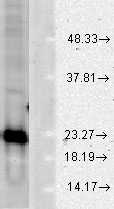Superoxide Dismutase 1 (SOD1) Rabbit Polyclonal Antibody [Clone ID: N/A]
Other products for "SOD1"
Specifications
| Product Data | |
| Clone Name | N/A |
| Applications | IF, WB |
| Recommended Dilution | 0.2ug/ml was sufficient for detection of Cu/Zn SOD in 20ug of HeLa cell lysate |
| Reactivities | Bovine, Hamster, Human, Monkey, Mouse, Rabbit, Rat, Sheep, Xenopus, Dog, Pig, Coral |
| Host | Rabbit |
| Clonality | Polyclonal |
| Immunogen | Human Cu/Zn SOD |
| Formulation | PBS pH7.0, 50% glycerol, 0.09% sodium azide |
| Concentration | lot specific |
| Purification | Affinity (antigen) Purified |
| Conjugation | Unconjugated |
| Storage | Store at -20°C as received. |
| Stability | Stable for 12 months from date of receipt. |
| Gene Name | superoxide dismutase 1, soluble |
| Database Link | |
| Background | Superoxide dismutase (SOD) is an endogenously produced intracellular enzyme present in almost every cell in the body . It works by catalyzing the dismutation of the superoxide radical O2¯to O2 and H2O2, which are then metabolized to H2O and O2 by catalase and glutathione peroxidase . In general, SODs play a major role in antioxidant defense mechanisms . There are two main types of SOD in mammalian cells. One form (SOD1) contains Cu and Zn ions as a homodimer and exists in the cytoplasm. The two subunits of 16 kDa each are linked by two cysteines forming an intra-subunit disulphide bridge . The second form (SOD2) is a manganese containing enzyme and resides in the mitochondrial matrix. It is a homotetramer of 80 kDa. The third form (SOD3 or EC-SOD) is like SOD1 in that it contains Cu and Zn ions, however it is distinct in that it is a homotetramer, with a mass of 30 kDA and it exists only in the extracellular space. SOD3 can also be distinguished by its heparin-binding capacity . |
| Synonyms | ALS; ALS1; HEL-S-44; homodimer; hSod1; IPOA; SOD |
| Note | Detects a ~23kDa (human) and 19kDa (other species) proteins corresponding to the molecular mass of Cu/Zn superoxide dismutase (SOD) on SDS PAGE immunoblots. |
| Reference Data | |
| Protein Families | Druggable Genome |
| Protein Pathways | Amyotrophic lateral sclerosis (ALS), Huntington's disease, Prion diseases |
Documents
| Product Manuals |
| FAQs |
{0} Product Review(s)
0 Product Review(s)
Submit review
Be the first one to submit a review
Product Citations
*Delivery time may vary from web posted schedule. Occasional delays may occur due to unforeseen
complexities in the preparation of your product. International customers may expect an additional 1-2 weeks
in shipping.






























































































































































































































































 Germany
Germany
 Japan
Japan
 United Kingdom
United Kingdom
 China
China




